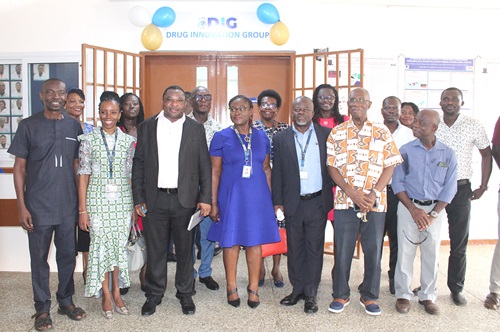
World-class lab opens at UG
A refurbished medicinal chemistry laboratory to be used to prepare compounds towards finding new treatments for malaria has been opened at the Department of Chemistry of the University of Ghana (UG).
The laboratory, which forms part of a project dubbed: “Supporting the development of a drug discovery hub in Ghana”, will in the future also be used to conduct research for finding medicines for other infectious diseases like tuberculosis, buruli ulcer and trypanosomiasis.
It is the first of its kind in sub-Saharan Africa to conduct that level of world class research that could lead to identifying medicines for the treatment of malaria and other forms of diseases. Only South Africa is recognised to have this kind of facility.
The over $100,000 refurbished chemistry laboratory, funded from the Bill and Melinda Gates Foundation, is a collaboration with the Noguchi Memorial Institute for Medical Research (NMIMR), the Department of Chemistry of the University of Ghana and the Kwame Nkrumah University of Science and Technology (KNUST).
At the opening of the laboratory at the University of Ghana last Thursday, the Founder and Head of the Drug Innovation Group and Head of Department of Chemistry, UG, Professor Richard Kwamla Amewu, explained that malaria was a big problem in Africa, and that globally, the existing medicines used to treat it were no longer effective as a result of resistance.
As such, he said, there was the need to find new medications, and that was what the refurbished medicinal chemistry laboratory sought to do. “We are looking for new compounds for testing activity against malaria. One of the challenges we have in Africa is that we don’t have the necessary facilities to conduct this kind of research.
You need a facility like this to be able to conduct this kind of research,” he said.
Refurbished laboratory
Prof. Amewu mentioned the special features of the refurbished laboratory to include an extractor that extracts toxic fumes in order not to endanger the health of people working within the space of the laboratory.
He said it also had rotary evaporators, which would help to remove the liquid solvent used to conduct the reaction in order to get the drug substance out. The Provost of the College of Basic and Applied Sciences of the UG, Prof. Boateng Onwona-Agyeman, expressed gratitude to the facility’s benefactors, and urged its managers to share the results of their works with others.
He said since Ghana did not manufacture any state-of-the-art equipment, and that maintenance of the facility should, therefore, be key to the facility’s managers and users.
